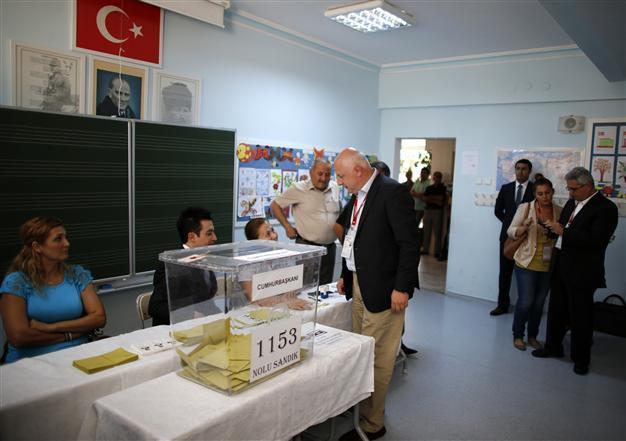Int’l bodies focus on biased media, use of public sources in Turkey’s election
ANKARA

George Tsreteli, Vice President of the Organization for Security and Co-operation in Europe (OSCE) Parliamentary Assembly, chats with election officials at a polling station in Ankara August 10, 2014. REUTERS Photo
Two leading international organizations have claimed the main flaw in the Aug. 10 presidential election was Prime Minister Recep Tayyip Erdoğan’s use of his official position and of public sources.
Despite this, they both remained convinced that all three candidates were able to campaign freely.
In Ankara, a group of observers from the Organization for Security and Co-operation in Europe (OSCE) and a team of observers from the Parliamentary Assembly of the Council of Europe (PACE) held a joint press conference on Aug. 11.
Yet, Erdoğan’s position gave him a “distinct advantage” over his rivals in the campaign, the OSCE delegation said for its part.
The OSCE observers acknowledged that Erdoğan and his two opponents were able to campaign freely and the right to freedom of assembly was respected in the polls.
“However, the prime minister’s use of his official position, along with the biased media coverage, gave him a distinct advantage over the other candidates,” they added.
Vilija Aleknaite-Abramikiene, special coordinator of the mission, said the elections showed a “vibrant political life” in Turkey.
“However, the challenges we have noted, particularly the imbalanced media coverage, must be overcome to fully live up to the democratic aspirations of the people,” the coordinator added.
For his part, the chief of the mission deployed by the Office for Democratic Institutions and Human Rights (ODIHR) of the OSCE, Ambassador Geert-Hinrich Ahrens said the elections were marked by a “lack of a level playing field,” which favored the premier.
Noting they would release their final report within six to eight weeks, Ahrens said their report would include “recommendations on how to improve Turkey’s election system.” He urged Turkish authorities to respond to their report with a “substantive follow-up to these recommendations,” rather than just defending their current system.
Ahrens notably underlined “a lack of clarity in legal framework,” regarding the current Turkish election system, which he feels needs to be addressed.
The PACE team echoed the same messages delivered by the OSCE team.
“The direct election of the president marks only the beginning of a new phase of Turkey’s democratic development,” said Meritxell Mateu Pi, head of the PACE delegation. “We will continue to work with Turkey and support its efforts in fulfilling the Council of Europe’s standards.”
In a joint statement, the OSCE and PACE observers have taken note of a lack of clarity and accountability that resulted in inconsistencies in the implementation of the legal framework, which was actually found to be generally conducive to the holding of democratic elections.
“The recent introduction of campaign finance regulations was a step forward, although these regulations do not extend to private and party sources of funding or provide adequate oversight of campaign financing or sanctions in the event of violations,” the joint statement said.
The introduction of out-of-country voting, which gave nearly three million citizens abroad the chance to vote was cited as “a positive step.” The observers noted, however, active conscripts, cadets and prisoners who have been convicted of intentional crimes were not permitted to vote.
